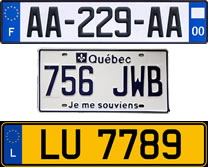
Yesterday I learnt that the French for a number plate / license plate / vehilce registration plate is une plaque d’immatriculation [source].
The word immatriculation means registration, and comes from the word immatriculer (to register), which comes from the Medieval Latin immatriculare (to join) [source]. This comes from the Latin mātrīcula (public register), a diminutive of mātrīx (uterus, womb, source, origin, list, register) [source].
Mātrīx comes from Latin māter (mother, woman, nurse, motherland), from the Proto-Italic *mātēr (mother), from Proto-Indo-European *méh₂tēr (mother), which is the root of words for mother in many languages [source].
The English word matrix comes from the Latin mātrīx, either directly, or via the Old French matrice (pregnant animal) [source].
I never know what connections I’ll find when I set off on an etymological adventure like this. Yesterday I found that matriculation and mātrīx were connected, which inspired me to write this, but I wouldn’t have guessed that mātrīx and māter were also connected.
